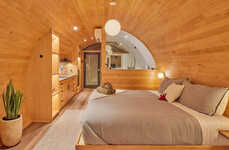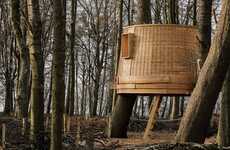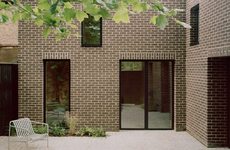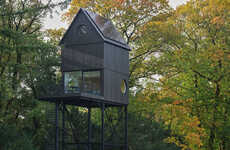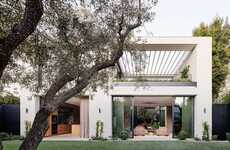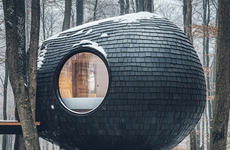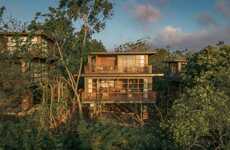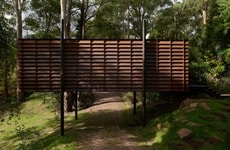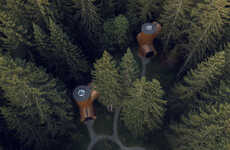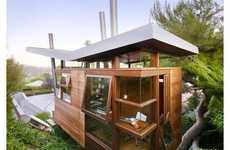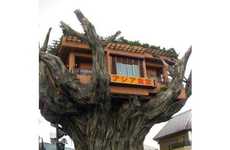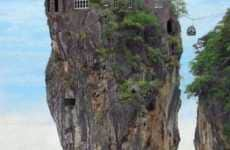
Aussie Arboreal Architecture
Arboreal architecture is no longer just for kids -- adults are building real tree houses to live in as their full-time homes. This community of homes is the brainchild of Australian architects, Steven Isaacs and Lisa Saville, who also happen to live in one of the Eucalyptus tree with their baby girl, Rafaela.
The pair was adamant about not cutting down any trees in the Hunters Hill location, so the project looked to others like it would pose nothing but impossible challenges. To the couple, however, it looked like an opportunity to get creative. At first, builders and tradesmen were put off by the abundance of trees on the 1,600 square meter property, but with the couple's enthusiasm, they were quickly inspired.
"The couple planned to build a pair of semis, one of which would be sold to help finance their remaining home," the Age explained. "At the entry level, open-plan kitchen and living areas would flow onto a 12-metre-high deck, perched above never-ending leafy vistas. Crucially, all this had to be achieved without removing a single tree."
In building the three to four bedroom properties, supported on steel piers that "touched the earth lightly," their main concern was building in an eco-sensitive way.
"We wanted the project to be as environmentally sensitive as possible. There would be no excavation and we didn't want to disturb nature," Isaacs says.
To give you an idea of their commitment to nature preservation, the couple has a 30 meter treat bursting through their deck. Instead of seeing it as a problem, the couple made the most of it, using it as a natural, sun-shielding canopy.
"'The relationship between inside and out was important to us,' says Isaacs, who designed a steel frame on the east side of the house to hold sliding doors out of sight and create seamless indoor-outdoor living," the Age said.
The design is highly modern and eco-friendly, through and through. The top floor is an open-plan living area while the lower level is comprised of more closed rooms such as the bedrooms and an office space... which happens to be built right into a cliff.
The pair was adamant about not cutting down any trees in the Hunters Hill location, so the project looked to others like it would pose nothing but impossible challenges. To the couple, however, it looked like an opportunity to get creative. At first, builders and tradesmen were put off by the abundance of trees on the 1,600 square meter property, but with the couple's enthusiasm, they were quickly inspired.
"The couple planned to build a pair of semis, one of which would be sold to help finance their remaining home," the Age explained. "At the entry level, open-plan kitchen and living areas would flow onto a 12-metre-high deck, perched above never-ending leafy vistas. Crucially, all this had to be achieved without removing a single tree."
In building the three to four bedroom properties, supported on steel piers that "touched the earth lightly," their main concern was building in an eco-sensitive way.
"We wanted the project to be as environmentally sensitive as possible. There would be no excavation and we didn't want to disturb nature," Isaacs says.
To give you an idea of their commitment to nature preservation, the couple has a 30 meter treat bursting through their deck. Instead of seeing it as a problem, the couple made the most of it, using it as a natural, sun-shielding canopy.
"'The relationship between inside and out was important to us,' says Isaacs, who designed a steel frame on the east side of the house to hold sliding doors out of sight and create seamless indoor-outdoor living," the Age said.
The design is highly modern and eco-friendly, through and through. The top floor is an open-plan living area while the lower level is comprised of more closed rooms such as the bedrooms and an office space... which happens to be built right into a cliff.
Trend Themes
1. Arboreal Architecture - Disruptive innovation opportunity: Develop sustainable and nature-integrated housing solutions.
2. Eco-sensitive Building - Disruptive innovation opportunity: Create construction techniques that minimize environmental impact and preserve ecosystems.
3. Seamless Indoor-outdoor Living - Disruptive innovation opportunity: Design innovative solutions that seamlessly connect indoor and outdoor spaces.
Industry Implications
1. Architecture - Disruptive innovation opportunity: Explore new ways to incorporate nature into architectural designs.
2. Construction - Disruptive innovation opportunity: Develop eco-friendly construction methods that minimize disturbance to the environment.
3. Interior Design - Disruptive innovation opportunity: Create products and spaces that enhance the connection between indoor and outdoor living.
4.3
Score
Popularity
Activity
Freshness

